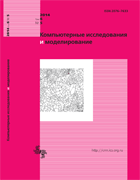All issues
- 2024 Vol. 16
- Issue 1 (special issue)
- 2023 Vol. 15
- 2022 Vol. 14
- 2021 Vol. 13
- 2020 Vol. 12
- 2019 Vol. 11
- 2018 Vol. 10
- 2017 Vol. 9
- 2016 Vol. 8
- 2015 Vol. 7
- 2014 Vol. 6
- 2013 Vol. 5
- 2012 Vol. 4
- 2011 Vol. 3
- 2010 Vol. 2
- 2009 Vol. 1
Description of the rapid invasion processes by means of the kinetic model
Recently many investigations have been devoted to theoretical models in new areas concerning description of different biological, sociological and historical processes. In the present paper we investigate the nazi Germany invasion in Poland, France and USSR from the kinetic theory point of view. We model this process with the Cauchy boundary problem for the two-element kinetic equations with spatial uniform initial conditions. The solution of the problem is given in the form of the traveling wave and the propagation velocity of a frontline depends on the quotient between initial forces concentrations. Moreover it is obtained that the general solution of the model can be obtained in terms of the quadratures and elementary functions. Finally it is shown that the frontline velocities are complied with the historical data.
- . Consideration of psychological factors in models of the battle (conflict). // Computer Research and Modeling. — 2016. — V. 8, no. 6. — P. 951. DOI: 10.20537/2076-7633-2016-8-6-951-964
Indexed in Scopus
Full-text version of the journal is also available on the web site of the scientific electronic library eLIBRARY.RU
The journal is included in the Russian Science Citation Index
The journal is included in the RSCI
International Interdisciplinary Conference "Mathematics. Computing. Education"







